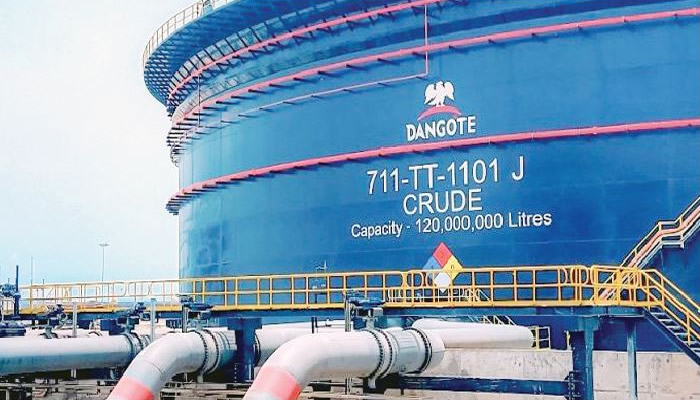The Depot and Petroleum Products Marketers Association of Nigeria (DAPPMAN) has raised the stakes in its standoff with Dangote Petroleum Refinery, threatening to take legal action over recent claims linking petroleum marketers to smuggling activities. The development has ignited a fresh wave of debate in Nigeria’s downstream oil sector, with stakeholders warning that the clash could have far-reaching consequences for the distribution of fuel nationwide.
The controversy began when the Dangote Group, through its refinery management, alleged that some petroleum marketers were engaged in the diversion and smuggling of products. According to the refinery, such activities not only undermine the stability of fuel supply within Nigeria but also place pressure on pricing, logistics, and the credibility of ongoing efforts to sanitize the sector. Dangote executives had suggested that regulatory agencies must do more to curb these practices, hinting that certain marketers may be exploiting loopholes in the system.

In response, DAPPMAN issued a strongly worded statement rejecting the allegations as baseless and damaging to the reputation of law-abiding marketers. The association argued that its members have consistently adhered to regulatory guidelines set by the Nigerian Midstream and Downstream Petroleum Regulatory Authority (NMDPRA) and other oversight agencies. According to the group, accusing marketers of smuggling without evidence was not only unfair but also an attempt to scapegoat key players in the distribution chain.
DAPPMAN stressed that petroleum marketers form a crucial part of Nigeria’s fuel supply network, handling distribution to both urban and remote areas despite challenges such as high transportation costs, foreign exchange shortages, and volatility in global energy markets. The association warned that insinuating criminal activity could erode public trust and destabilize a fragile system that relies heavily on collaboration between refiners, marketers, and regulators.
The association stated clearly that unless Dangote Petroleum Refinery provides verifiable proof to substantiate its smuggling allegations, it would instruct its legal team to initiate court proceedings. DAPPMAN described the refinery’s claims as “reckless and damaging,” insisting that its members would not allow their hard-earned credibility to be undermined by what it considered corporate grandstanding.
Industry watchers note that this clash comes at a critical moment for Nigeria’s oil and gas industry. The Dangote Refinery, which began operations in late 2023, has been positioned as a game-changer in the nation’s quest for energy self-sufficiency. With a refining capacity of 650,000 barrels per day, it is expected to significantly reduce Nigeria’s reliance on imported petroleum products. However, the refinery’s entry into the market has also disrupted existing structures, creating friction with traditional players such as DAPPMAN, whose members have long been central to the distribution chain.
Some analysts argue that the dispute highlights underlying tensions over control of Nigeria’s downstream sector. They point out that Dangote’s dominance in refining gives it considerable leverage in determining supply and pricing dynamics, while marketers remain responsible for ensuring products reach consumers across the country. Any perception of conflict between these two sides, they warn, could create uncertainty in the market and potentially impact fuel availability.
Regulatory authorities are now under pressure to step in and mediate before the situation escalates. Stakeholders are calling on the NMDPRA and the Nigerian National Petroleum Company Limited (NNPC Ltd.) to engage both parties and encourage dialogue rather than confrontation. According to experts, only a balanced approach that fosters cooperation will guarantee stability in fuel supply and maintain investor confidence in Nigeria’s energy sector.
Meanwhile, Nigerians are watching developments closely, given that disputes in the downstream oil sector often have immediate implications for fuel availability and pricing. The memory of long queues at filling stations and repeated bouts of scarcity remains fresh in the minds of many, and any hint of disruption raises public anxiety.
Analysts believe that Dangote’s concerns about smuggling cannot be dismissed entirely, as cross-border fuel diversion has historically plagued Nigeria due to its porous borders and wide price differentials with neighboring countries. However, they caution that blanket allegations against marketers risk alienating critical partners at a time when collaboration is essential. Instead, they suggest that the focus should be on strengthening monitoring systems, enhancing border controls, and deploying technology to track fuel distribution.
On the other hand, DAPPMAN’s firm stance reflects the association’s determination to protect its reputation and assert its relevance in an evolving market. As the industry adapts to the presence of a mega-refinery and the federal government’s deregulation policies, marketers are keen to ensure they are not sidelined or unfairly maligned.
The potential for litigation adds another layer of complexity to the dispute. Legal proceedings could drag on and further strain relations within the sector. Observers suggest that both Dangote and DAPPMAN would benefit more from dialogue and collaboration than courtroom battles, particularly in light of Nigeria’s broader economic challenges, including high inflation, exchange rate instability, and efforts to attract foreign investment.
As tensions simmer, one thing is clear: the outcome of this face-off will shape perceptions about how Nigeria’s downstream petroleum industry can balance the interests of powerful refiners and independent marketers. Whether through negotiation or legal contest, the resolution will serve as a litmus test for the industry’s ability to manage conflicts in a way that prioritizes national interest and consumer welfare.
For now, DAPPMAN has drawn a line in the sand, warning that unless Dangote retracts or substantiates its claims, the courts will become the next battleground. With fuel distribution and energy stability at stake, industry stakeholders will be hoping for a swift resolution that prevents the dispute from spiraling into a wider crisis.
Support InfoStride News' Credible Journalism: Only credible journalism can guarantee a fair, accountable and transparent society, including democracy and government. It involves a lot of efforts and money. We need your support. Click here to Donate
